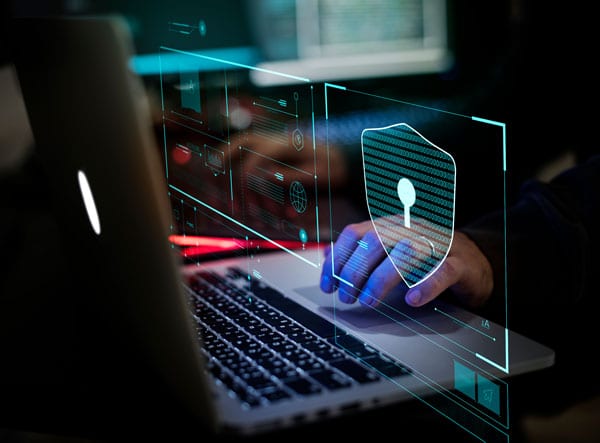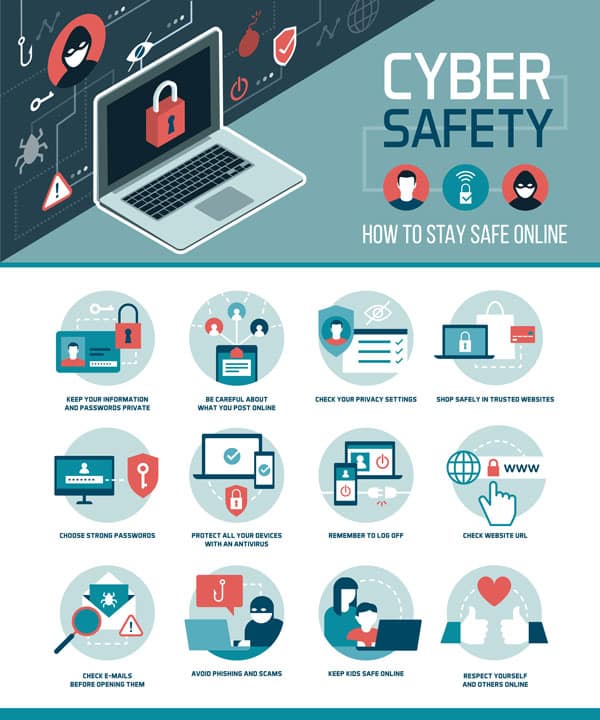The Importance of Cyber Security
Posted December 05, 2019 in Cyber insurance
4 minute read:
Security on every level and branch is always wise to have to help ward off potential threats and risks.
But what about your online content and information stored on your computer or laptop? How well do you understand cyber attacks and malware, and how efficient is your security system?

Deficiencies in protection from security breaches can lead to some costly losses and potential lawsuits.
Gallant Risk & Insurance Services, Inc., has taken significant steps to secure and protect cloud computing services and increase cybersecurity through training as well as new approaches and practices to help our clients feel more secure with their private information.
Our team of professionals is devoted to client confidentiality and protection.
What Exactly Is Cyber Security?
Cybersecurity is discussing online activities and how to protect private information from being accessed by an unauthorized party. Cybersecurity includes various techniques to help keep unauthorized people from gaining access to sensitive data.
If security measures are breached, the data can be damaged, deleted, or used for identity theft or a myriad of other malicious uses.
How Can I Protect Myself and My Business?
Below are some practical tips for ensuring a tighter security system that can catch cyberattacks sooner and reduce the risk of losing valuable information to a hacker.
13 Tips for Improved Cyber Security
Here are some tips for protecting yourself from cyberattacks:
- Never open an email attachment from someone that you do not know. Even email addresses can be compromised, so it is a safe practice to ask the sender if they indeed sent what you received before opening the document.
- Be sure that all security and privacy settings are turned on or enabled for your websites and social media accounts. Any time you post something online or host information, you want to ensure that the data is set to private and is not easily accessible by other parties.
- Make sure that you have a firewall in place by installing or enabling it on all of your devices.
- Use browser incognito or private options and change your browser security settings to avoid pop-up windows. If a pop-up appears, do not click on the links within them. Visit websites directly instead of through a link.
- Update your VPN with data encrypting so that the backend is not easily accessed or read by uninvited third parties. There are also apps that can be utilized to communicate how well your data encryption is doing, such as WhatsApp.
- Refuse to give out your personal information to unknown sources (an email, a questionable phone call, or anything along these lines).
- Use cash instead of a credit or debit card, whenever possible. There is no protection from credit card fraud or identity theft when you use a credit card because you can use it online quite easily, and someone can scan your numbers quickly.
- Frequently change your passwords and use a different password for everything you log into. You want to make your password complicated, with many letters, numbers, symbols, capitalizations and lowercase, and create a lengthy password to make your accounts as difficult to hack as possible.
- Monitor credit card activity regularly to catch unintentional or unknown purchases, especially if you use your credit card to make purchases online.
- Use antivirus and antimalware program or company to scan your computer for viruses and potential threats to your data. Keep your software updated so it can remain current with any new attack mechanisms to counteract.
- Back-up your information and files often so you have it saved in case of a worst-case-scenario.
- Try only to use a VPN to access the internet; Wi-Fis or hotspots are easily hacked, while VPNs are more secure.
- Lock your screen if you step away from your phone, computer, or laptop. You can store these devices or a flash drive in a locked area for added protection.

Rest Assured
Although there is no such thing as being 100% protected, you can feel comfortable when your information is kept private, and the most technologically advanced methods of protection are utilized.
At Gallant Risk & Insurance Services, Inc., we take your personal information very seriously and use the utmost care when storing data in a cloud service to ensure that your data is as safe as possible.
Call us today at (951) 368-0700 to learn more about cybersecurity and what protective insurance policies are available.